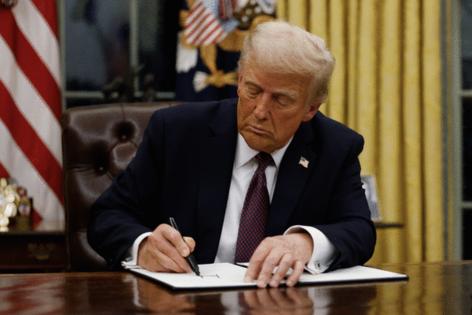Trump's rebuke to 'gender ideology' changes federal policy and sets up clash with blue states
Published in Political News
WASHINGTON — President Donald Trump's executive order rejecting liberal "gender ideology" and restoring the "biological truth" of two sexes sets the stage for a legal battle in blue states over transgender students and adults.
Trump says his administration will only recognize "two sexes, male and female" in federal policy, and not "gender identity" that differs from "biological reality."
"These sexes are not changeable," he said in the executive order issued this week. "Sex is not a synonym for and does not include the concept of 'gender identity.'"
Trump's order fulfills a campaign promise and is likely to have a broad sweep in federal rules, from passports to prisons.
"Agency forms that require an individual's sex shall list male or female," it said, and prison officials "shall ensure that males are not detained in women's prisons."
But the order, which makes no mention of transgender people, conflicts with laws in California and other blue states that forbid discrimination based on gender identity.
Those state laws are not repealed by a change in federal policy, but they are likely to face legal challenges, including from new Trump administration regulations.
"In practice, what this order means is that the administration is not only denying that transgender people have rights, but that they exist," said Georgetown Law Professor David Cole, the former legal director for the ACLU. "There are about 1.5 million people in the United States who are transgender, and that reality cannot be denied with an executive order."
Jennifer Pizer, legal director for Lambda Legal in Los Angeles, sees the Trump order as an opening salvo in what could be a long legal battle.
"This is an ideological crusade trying to turn the clock back. They are trying to establish the principle that there's no duty to respect trans people," she said. "Trans people exist. We can't erase them by writing a new definition."
The Supreme Court has not ruled on whether government discrimination against transgender people is unconstitutional. Until now, it has mostly deferred to the states.
But in 2020, Cole won a 6-3 ruling in the Supreme Court that forbids job discrimination against employees based on their sexual orientation or gender identity. The federal Civil Rights Act says employers may not discriminate based on race or sex, and the court in an opinion by Justice Neil M. Gorsuch said discrimination against LGBTQ employees was discrimination based on sex.
That decision could prove significant in legal fights over Trump administration regulations and blue-state laws as the courts seek to clarify the meaning of federal statutes, including civil rights and education laws.
"The [Supreme] Court has already ruled that transgender discrimination is by definition a form of sex discrimination," Cole said.
However, the court's conservative majority has signaled it is likely to uphold laws in Republican-led states that limit the rights of transgender adolescents.
California and other Democratic-led states do not restrict doctors from prescribing puberty blockers or hormones from those under age 18 who are diagnosed with gender dysphoria. But in December, the justices heard arguments in a Tennessee case and sounded ready to uphold that state's ban on these treatments for teens.
While a ruling for Tennessee would affirm similar laws in the Republican-led states, it would not impose those restrictions in California.
Legal experts said it is too soon to tell whether the new Republican administration will succeed in enforcing significant changes in the Democratic-led states.
One possibility is to reinterpret Title IX, the 1972 education law that forbids schools and colleges from discriminating on the basis of sex.
Last year, the Education Department under the Biden administration announced new regulations under Title IX favored by progressives. One provision would have allowed transgender students to use bathrooms or lockers consistent with their gender identity.
Republican states sued and won court orders to block those regulations, and Trump has now repealed them.
The new administration could adopt regulations that take the opposite approach and prohibit schools from recognizing a student's "gender identity."
Another much-discussed option would require students participating in sports to compete against others of the same biological sex, regardless of gender identity.
Such rule changes would likely be challenged in court, but if upheld, they would apply in California and other blue states.
Schools and colleges receive federal funds, and they are required to follow federal regulations.
"At this point, it is hard to know what [Trump's order] will mean in California. The executive order by itself applied only to the federal government," said Erwin Chemerinsky, dean of the UC Berkeley Law School. "The impact on states with different policies is unclear at this point."
©2025 Los Angeles Times. Visit at latimes.com. Distributed by Tribune Content Agency, LLC.




























































Comments